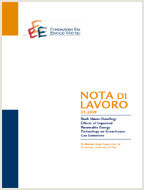Optimal Emission Policy under the Risk of Irreversible Pollution

14.01.2011
Alain Ayong Le Kama, Aude Pommeret, Fabien Prieur
D81, Q54, Q58
Optimal Control, Irreversibility Threshold, Uncertainty, Optimal Reversible, Irreversible Policy
Climate Change and Sustainable Development
Carlo Carraro
We consider an optimal consumption and pollution problem that has two important features. Environmental damages due to economic activities may be irreversible and the level
at which the degradation becomes irreversible is unknown. Particular attention is paid to the situation where agents are relatively impatient and/or do not care a lot about the environment and/or Nature regenerates at low rate. We show that the optimal policy of the uncertain problem drives the economy in the long run toward a steady state while, when ignoring irreversibility, the economy follows a balanced growth path accompanied by a perpetual decrease in environmental quality and consumption, both asymptotically converging toward zero. Therefore, accounting for the risk of irreversibility induces more conservative decisions regarding consumption and polluting emissions. In general, however, we cannot rule out situations where the economy will optimally follow an irreversible path and consequently, will also be left, in the long run, with an irreversibly degraded environment.
